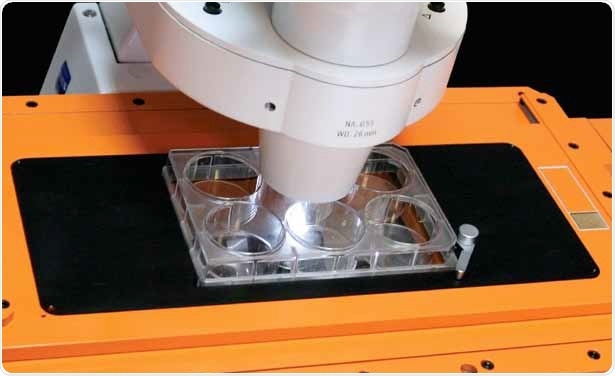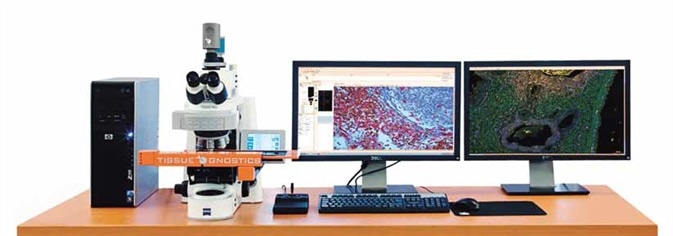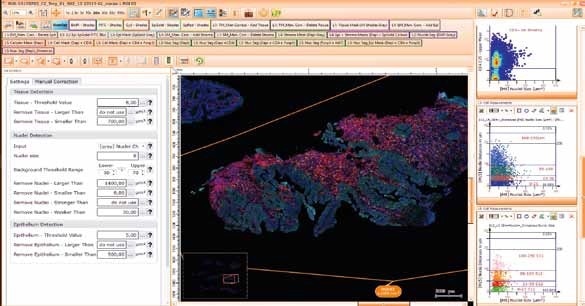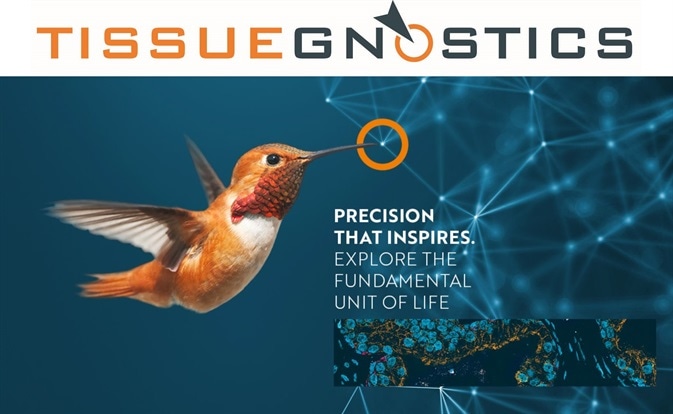A Viennese company strives to revolutionize healthcare diagnostics: a new technology analyzes cells and aids in producing targeted therapies.
The computer screen slowly turns pale blue, which is the color representing cancer cells present in a tissue sample, scattered with bits of brown. The brown shows the immune cells which have been incapacitated by the tumor.

© TissueGnostics
The computer program which has been developed by the Viennese company TissueGnostics makes it possible to analyze the following:
- How many immune cells are in any given part?
- Where in the sample is the number of cancer cells particularly high?
TissueGnostics has developed a procedure that characterizes tumor tissue automatically, and in doing so, supplies the basis for what is frequently called the personalized medicine of the future.

This new technology allows to better understand the molecular mechanisms of disease formation. This is required for choosing the optimal therapy for any given patient and to avoid that a patient receives an ineffective treatment.
When a simplified version of it is presented, it sounds like a simple development: we have to do more than just diagnose a disease for us to be able to use targeted therapies in the first place. We have to be even more accurate, recognizing the type of disease.
In a number of instances, for example a particular type of cancer, it has its own specificities. We can also use the appropriate medication in a targeted manner when we can establish these precisely, but how can so many details be established?
A Complex Diagnosis
Pathologists nowadays use tissue samples not only to determine what type of cancer a patient has; if, for example, a particular cancer gene is active, this produces a special protein which appears on the surface of the cells. Only a few agents are able to interact with that protein and can thus attack the tumour.
Rupert Ecker, Managing Director of TissueGnostics.
Yet, the diagnosis of these proteins is difficult. Mr Ecker, who has a doctorate in cell biology, would spend days at a time conducting painstaking analyses of cells in tissue sections with a computer.
He was writing his thesis whilst working in the research laboratory for urology at the Medical University of Vienna at the time. It was very challenging work and particularly error-prone, as the differences are usually minimal.
Using immunostaining, a pathologist can identify proteins. The greater the volume of a particular protein present, the more antibodies will bind to it, which will result in a stronger color reaction. Yet, the perception of a color’s intensity is extremely subjective. Furthermore, there are in the region of 30,000 different proteins.
We work in close cooperation with universities and, in doing so, contribute to international cancer research.
Rupert Ecker, CEO, TissueGnostics.
Award-Winning Software
He set about developing software to analyze microscope images automatically – quickly and with high accuracy. TissueGnostics was launched 15 years ago and it took off well. Today, research institutes and universities and from all over the USA, Europe, and China employ the company’s software.
Not only is it utilized in oncology, it has been used in dermatology and neurology for a long time now. Around 1000 scientific papers have been published already. TissueGnostics is being asked to take part in an increasing number of research initiatives as an industry partner because of the company’s expertise in the fields of tissue cytometry and automated microscopy.
The company supports research which is related to personalized medicine; to date it has been invited to four Marie Sklodowska Curie Innovative Training Networks, which are sponsored by the EU. These programmes are dedicated to developing many tenets and aspects of precision medicine, both technical and translational in nature (see below).

TissueGnostics’ award-winning software to analyze medical images creates the basis for the individualized medicine of the future, helping to organize millions of data points. (© TissueGnostics (2))

Support for Research in the EU
Calcium Sensing Receptor
A project based in Vienna, the CaSR Biomedicine European Training Network (ETN) is research focused solely on a single molecule, the CaSR (calcium-sensing receptor). It looks at its role in a number of physiological processes and diseases. It is developing a unique, multidisciplinary and intersectoral training programme.
Breakfree From Cancer
The European Training Network “ALKATRAS – Breakfree from cancer” is integrated into an internationally established research programme: the European Research Initiative on Anaplastic Lymphoma Kinase (ALK)- related malignancies. It is a network with 13 research partners.
Cell Migration Studies
Offering young researchers the chance to improve their research and business skills and, by extension, their career opportunities: InCeM is an international Ph.D. programme. The programme’s main focus is on research related to cell migration, a fundamental biological process that happens everywhere in the human body.
Digital Pathology
AIDPATH was an IAAP Marie Curie Action European Union’s FP7 Framework Programme that ran from 2013 to 2017. TissueGnostics was a partner at the “Academia and Industry Collaboration for Digital Pathology” (AIDPATH), an international project on the development of efficient and innovative products for digital pathology.

About TissueGnostics
TissueGnostics (TG) is an Austrian company focusing on integrated solutions for high content and/or high throughput scanning and analysis of biomedical, veterinary, natural sciences and technical microscopy samples.
TG has been founded by scientists from the Vienna University Hospital (AKH) in 2003. It is now a globally active company with subsidiaries in the EU, the USA and China and customers in 30 countries.
TissueGnostics Portfolio
TG scanning systems are currently based on versatile automated microscopy systems with or without image analysis capabilities. We strive to provide cutting-edge technology solutions, such as multispectral imaging and context-based image analysis as well as established features like Z-Stacking and Extended Focus. This is combined with a strong emphasis on automation, ease of use of all solutions and the production of publication-ready data.
The TG systems offer integrated workflows, i.e. scan and analysis, for digital slides or images of tissue sections, Tissue Microarrays (TMA), cell culture monolayers, smears and of other samples on slides and oversized slides, in Microtiter plates, Petri dishes and specialized sample containers. TG also provides dedicated workflows for FISH, CISH and other dot structures.
TG analysis software, apart from being integrated into full systems is fully standalone capable and supports a wide variety of scanner image formats as well as digital images taken with any microscope.
TG also provides routine hematology scanning and analysis systems for peripheral blood, bone marrow and body fluids.
Sponsored Content Policy: News-Medical.net publishes articles and related content that may be derived from sources where we have existing commercial relationships, provided such content adds value to the core editorial ethos of News-Medical.Net which is to educate and inform site visitors interested in medical research, science, medical devices and treatments.